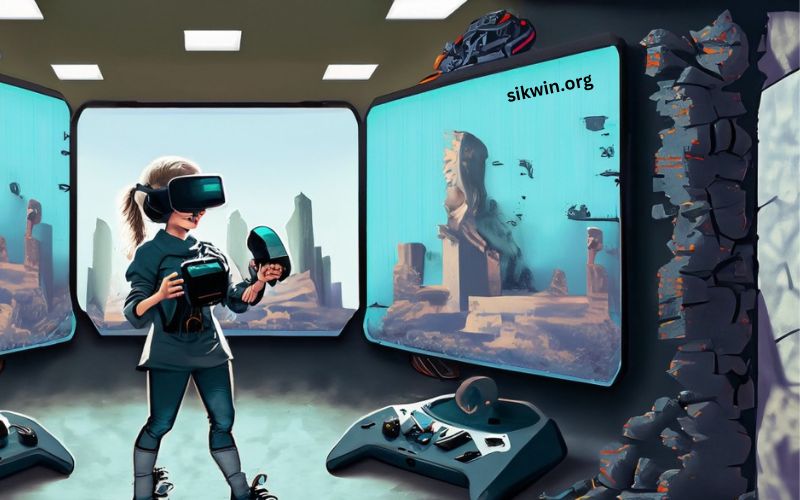The world of gaming and hospitality is rapidly evolving, with technological advancements reshaping the way we experience entertainment and accommodation. As we step into the future, the convergence of gaming and hotel services promises to redefine the way we play, relax, and indulge in our leisure time. In this article, we’ll explore the exciting possibilities that lie ahead, delving into the innovative technologies and trends that will shape the future of gaming and hotel services.
Technological Advancements in the Gaming Industry
The gaming industry has been at the forefront of technological innovation, constantly pushing the boundaries of what’s possible. From the rise of virtual reality (VR) to the integration of artificial intelligence (AI), the gaming landscape is undergoing a profound transformation. VR headsets have the power to immerse players in fully-realized, three-dimensional environments, blurring the lines between reality and fantasy. This technology has the potential to revolutionize the gaming experience, offering a level of realism and interactivity that was once unimaginable.
-
Virtual Reality in Gaming
- VR gaming allows players to step into the heart of the action, with motion-tracking technology and realistic visuals that create a truly immersive experience.
- Game developers are leveraging VR to create breathtaking worlds and narratives, offering players a sense of presence and agency that traditional gaming cannot match.
- The integration of haptic feedback and motion-controlled peripherals further enhances the VR gaming experience, allowing players to physically interact with the virtual environment.
-
Advancements in Graphics and Processing Power
- Continuous improvements in graphics processing units (GPUs) and central processing units (CPUs) have enabled game developers to create visually stunning and technologically advanced games.
- The rise of cloud gaming and streaming services has made high-quality gaming accessible to a wider audience, without the need for powerful local hardware.
- Innovations in rendering techniques, such as ray tracing and real-time lighting, have elevated the visual fidelity of games, blurring the line between virtual and reality.
-
Artificial Intelligence in Gaming
- AI-powered game engines are revolutionizing the way non-player characters (NPCs) behave and interact with players, creating more intelligent and dynamic game worlds.
- Adaptive AI systems can learn from player behavior and adjust the game’s difficulty or narrative to provide a personalized and challenging experience.
- The integration of AI in game development has also led to advancements in procedural content generation, allowing for the creation of vast, diverse, and ever-changing game environments.
Impact of Virtual Reality on Gaming Experiences
The immersive nature of virtual reality has the potential to transform the gaming experience in unprecedented ways. VR technology has the power to transport players to fantastical realms, where they can explore, interact, and engage with the virtual world in a deeply personal and visceral manner.
-
Increased Sense of Presence and Immersion
- VR gaming allows players to feel as if they are physically present within the game world, fostering a greater sense of immersion and emotional investment.
- The ability to look around and move naturally within the virtual environment enhances the sense of presence, making the gaming experience more authentic and captivating.
- Advancements in haptic feedback and motion-tracking technology further enhance the sense of physical interaction, blurring the boundaries between the real and the virtual.
-
Enhanced Storytelling and Narrative Experiences
- VR gaming enables game developers to craft more immersive and engaging narratives, as players become active participants in the story.
- The ability to explore and interact with the virtual environment in a first-person perspective can deepen the emotional connection between the player and the game’s characters and events.
- VR gaming can also facilitate more collaborative and shared experiences, allowing multiple players to explore and interact with the same virtual world simultaneously.
-
New Avenues for Gameplay and Interaction
- VR gaming introduces new gameplay mechanics and control schemes that leverage the unique capabilities of the technology, such as hand gestures, gaze-based interactions, and physical movement.
- The integration of motion-tracking and haptic feedback can create more intuitive and natural ways for players to engage with the game world, enhancing the overall gaming experience.
- VR gaming also presents opportunities for innovative game genres and experiences that cater to a wider range of interests and preferences, from action-packed adventures to meditative and contemplative experiences.
The Rise of Augmented Reality in Hotel Services
Augmented reality (AR) is another transformative technology that is making its mark on the hotel industry. By blending digital information and virtual elements with the physical environment, AR has the potential to enhance the guest experience and streamline hotel operations.
-
Personalized Guest Experiences
- AR-powered mobile apps can provide guests with interactive maps, wayfinding assistance, and contextual information about the hotel’s amenities and services.
- AR technology can also enable virtual concierge services, allowing guests to access information, make requests, and even control various aspects of their hotel room through their mobile devices.
- AR-enhanced in-room experiences, such as virtual artwork, interactive entertainment, and personalized room settings, can create a more immersive and memorable stay for guests.
-
Improved Hotel Operations and Efficiency
- AR-powered maintenance and housekeeping applications can assist hotel staff in quickly identifying and addressing issues within guest rooms, streamlining the service and repair process.
- AR-enabled training and guidance can help hotel employees learn new skills and procedures more effectively, improving overall service quality and efficiency.
- AR technology can also be used for virtual hotel tours and remote property management, allowing hotel executives and managers to oversee multiple locations and make informed decisions from anywhere.
-
Enhanced Guest Engagement and Loyalty
- AR-powered hotel apps can offer personalized recommendations, promotions, and loyalty program incentives, fostering stronger engagement and loyalty among guests.
- Interactive AR experiences, such as virtual concierge services or augmented reality-based games, can encourage guests to explore the hotel’s offerings and share their experiences on social media, generating valuable word-of-mouth marketing.
- By seamlessly integrating AR technology into the hotel experience, hotels can differentiate themselves from competitors and create a more memorable and engaging stay for their guests.
Gamification in the Hotel Industry
The concept of gamification is gaining traction in the hotel industry, as hotels seek to enhance the guest experience and foster greater engagement. By incorporating game-like elements and mechanics into their services, hotels can create a more interactive and rewarding environment for their guests.
-
Loyalty Programs and Rewards
- Hotels are leveraging gamification to make their loyalty programs more engaging and motivating for guests.
- Features such as point-based systems, leaderboards, and virtual badges can encourage guests to earn rewards and achieve higher status levels within the program.
- Gamified loyalty programs can foster a sense of competition and achievement, leading to increased guest engagement and loyalty.
-
Interactive Experiences and Challenges
- Hotels are introducing game-like elements into their guest experiences, such as scavenger hunts, puzzle-solving challenges, and interactive hotel tours.
- These gamified experiences can encourage guests to explore the hotel’s amenities, participate in social activities, and share their experiences on social media.
- Gamification can also be used to promote eco-friendly practices, with guests earning rewards for engaging in sustainable behaviors during their stay.
-
Employee Engagement and Training
- Gamification can also be applied to hotel employee training and development programs, making the learning process more engaging and effective.
- Game-based simulations and challenges can help employees acquire new skills, improve their problem-solving abilities, and foster a sense of teamwork and collaboration.
- Gamified training programs can also provide real-time feedback and incentives, motivating employees to continuously improve their performance and contribute to the overall success of the hotel.
Personalization and Customization in Gaming and Hotel Experiences
As the gaming and hotel industries evolve, the demand for personalized and customized experiences has become increasingly important. Leveraging data-driven insights and advanced technologies, both industries are striving to create tailored experiences that cater to the unique preferences and needs of their customers.
-
Personalized Gaming Experiences
- Adaptive AI systems in gaming can analyze player behavior and preferences to adjust the game’s difficulty, narrative, and content in real-time, providing a customized experience for each individual player.
- Recommendation algorithms can suggest new games, downloadable content, and in-game purchases based on a player’s gaming history and preferences, enhancing their discovery and engagement.
- Customizable player avatars, character progression systems, and in-game settings allow gamers to personalize their gaming experience and express their unique style and preferences.
-
Customized Hotel Experiences
- Hotels are using data analytics and guest profiling to understand the preferences and behaviors of their guests, enabling them to offer tailored services, amenities, and experiences.
- Personalized room settings, such as customized lighting, temperature, and entertainment options, can create a more comfortable and inviting environment for guests.
- Concierge services and mobile applications can provide guests with personalized recommendations for dining, activities, and local attractions, enhancing their overall stay.
-
Seamless Integration of Gaming and Hotel Services
- The convergence of gaming and hotel services presents opportunities for cross-pollination, where guests can enjoy personalized gaming experiences as part of their hotel stay.
- Hotels may offer in-room gaming setups, VR experiences, and even exclusive gaming lounges, catering to the growing demand for immersive entertainment.
- By integrating gaming elements into the hotel experience, hotels can create a more engaging and memorable stay for their guests, fostering loyalty and positive word-of-mouth.
Integration of Artificial Intelligence in Gaming and Hotel Services
Artificial intelligence (AI) has become a powerful tool in shaping the future of both the gaming and hotel industries. From enhancing the player experience to optimizing hotel operations, AI is revolutionizing the way these sectors function.
-
AI-Powered Game Engines and Adaptive Gameplay
- AI-driven game engines can create more intelligent and dynamic non-player characters (NPCs), with the ability to learn and adapt to player behavior.
- Adaptive AI systems can adjust the game’s difficulty, narrative, and content in real-time, providing a personalized and challenging experience for each player.
- AI-powered procedural content generation can create vast, diverse, and ever-changing game environments, enhancing the replayability and longevity of games.
-
AI-Enabled Hotel Operations and Guest Services
- AI-powered chatbots and virtual assistants can provide 24/7 customer support, answering guest queries, handling reservations, and even offering personalized recommendations.
- AI-driven predictive analytics can help hotels anticipate guest needs, optimize staffing and resource allocation, and improve operational efficiency.
- AI-powered systems can automate various hotel tasks, such as room maintenance, energy management, and inventory control, freeing up staff to focus on delivering exceptional guest experiences.
-
AI-Driven Personalization and Customization
- AI algorithms can analyze guest data, preferences, and behaviors to provide personalized recommendations for amenities, services, and experiences.
- AI-powered recommendation engines can suggest relevant in-game purchases, downloadable content, and new game titles based on a player’s gaming history and preferences.
- AI-enabled systems can also adapt the hotel environment, such as lighting, temperature, and entertainment options, to cater to individual guest preferences, creating a more tailored and comfortable stay.
Sustainability and Eco-Friendly Practices in the Future of Gaming and Hotel Services
As the world becomes increasingly conscious of environmental sustainability, the gaming and hotel industries are also embracing eco-friendly practices to reduce their carbon footprint and contribute to a greener future.
-
Sustainable Game Development and Distribution
- Game developers are exploring ways to reduce the environmental impact of game development, such as using renewable energy sources, optimizing resource consumption, and implementing circular economy principles.
- Digital distribution of games through online platforms is reducing the need for physical media and transportation, lowering the industry’s carbon emissions.
- Game companies are also investing in initiatives to offset their environmental impact, such as tree-planting programs and support for renewable energy projects.
-
Eco-Friendly Hotel Operations and Design
- Hotels are implementing sustainable practices, such as energy-efficient lighting, water conservation systems, and waste management programs, to minimize their environmental footprint.
- Sustainable hotel design, incorporating renewable materials, natural ventilation, and passive cooling systems, can reduce the energy and resource demands of hotel operations.
- Hotels are also exploring the use of renewable energy sources, such as solar panels and geothermal systems, to power their facilities and reduce their reliance on fossil fuels.
-
Gamification of Sustainability
- Hotels are leveraging gamification to encourage guests to adopt eco-friendly behaviors during their stay, such as reducing water and energy consumption or participating in recycling programs.
- Game-like elements, such as point systems, leaderboards, and virtual badges, can motivate guests to engage in sustainable practices, fostering a sense of competition and achievement.
- By making sustainability a fun and rewarding experience, hotels can inspire guests to adopt eco-friendly habits, both during their stay and in their everyday lives.
Challenges and Opportunities in the Future of Gaming and Hotel Services
As the gaming and hotel industries embrace technological advancements and evolving consumer preferences, they also face a range of challenges and opportunities that will shape the future of these sectors.
-
Challenges
- Balancing innovation and user experience: Keeping up with the rapid pace of technological change while ensuring a seamless and intuitive user experience can be a significant challenge.
- Ensuring data privacy and security: The collection and use of personal data to personalize experiences raise concerns about data privacy and security, which must be addressed.
- Addressing the digital divide: Ensuring that the benefits of technological advancements are accessible to all, regardless of socioeconomic status or technological literacy, is crucial.
- Maintaining sustainability and environmental responsibility: Balancing the demands of growth and innovation with sustainable practices and eco-friendly initiatives can be a complex undertaking.
-
Opportunities
- Enhancing guest experiences and loyalty: The integration of cutting-edge technologies, such as VR, AR, and AI, can create highly personalized and engaging experiences that drive guest satisfaction and loyalty.
- Improving operational efficiency and profitability: The use of AI and data analytics can optimize hotel operations, reduce costs, and increase revenue streams.
- Fostering cross-industry collaboration: The convergence of gaming and hotel services presents opportunities for strategic partnerships and the development of innovative products and services.
- Addressing emerging consumer trends: Catering to the evolving preferences of tech-savvy, experience-driven consumers can open up new markets and revenue opportunities.
To stay ahead of the curve and be part of the future of gaming and hotel services, subscribe to our newsletter for the latest insights, trends, and industry updates. Don’t miss out on the opportunity to revolutionize your gaming and hotel experiences.




